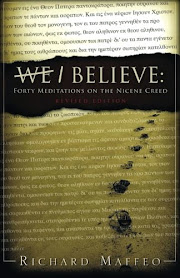I wrote this twelve years ago. The message, though, is the same.
---------------
I will never forget Christmas 1997.
A week before Christmas we were on our way from Texas to San Diego – orders of the US Navy. Nancy and I, along with our three teens, crammed into the minivan and made our way westward, sandwiched among luggage, bags of dirty laundry and an assortment of on-the-road lunches. The rhythmic thump-thump-thump of tires slapping across asphalt, and the monotonous engine hum, stretched six hours a day into what seemed a dozen. We thought the journey would never end until, with frayed nerves, we pulled into San Diego.
Under different circumstances, San Diego is a nice place to pull into. However, two days before Christmas, a city of more than a million strangers was not my idea of a great place to spend the holiday. It’s a good thing none of us knew things were about to take a turn for the worse.
I awakened the next morning with a deep, wall-rattling cough. By noon my temperature hit 101. It hovered at 103 on Christmas day. Bundled under blankets, alternately shivering and perspiring, I did not at all feel “joyful, joyful.” Instead, I felt guilty for not acting “spiritual” and thanking God for all things -- even the flu. But I was too sore and too tired to mumble much more than a woeful, “why me, Lord?”
As I lay in bed, lamenting my fate and listening to Nancy read St. Luke’s account of the Christmas story, I noticed a similarity between my Christmas and the one of two thousand years ago.
The journey from Nazareth to Bethlehem would have been difficult enough under the best of conditions. First century travelers
didn’t enjoy asphalt highways, restaurants every few exits and cell phones in their donkeys’ saddlebags. And for Joseph and Mary, that trip undoubtedly was not at the top of their list of fun things to do.
Their baby was due anytime and, like most parents, they expected to give birth surrounded by friends and family. But a governmental order changed everyone’s plans. Joseph and Mary had little choice but to load the donkey with luggage and food for the trip.
Under different circumstances, Bethlehem might have been a nice town to ride into. At this time, however, it was swollen with thousands of strangers. All the four star motels were full. Even the one-stars overflowed with visitors.
And, to make a bad situation worse, Mary went into labor.
Some Christmas cards picture Joseph and Mary sitting on clean straw in a scrubbed barn, gazing serenely at their baby lying in a manger.
I doubt that’s how it happened. They were both bone-tired from the grueling journey. They longed to find a place to bathe away their grime and sweat, and they longed for a warm bed on which they could let their weariness give way to refreshing sleep.
Instead, they arrived in a city of strangers and Joseph searched in vain from motel to motel, not finding so much as a cot for his wife to sleep on. And so, alone, they settled for the night in a darkened corner of a barn, to the smell of manure and rotting straw.
Despite their deep disappointments, I don't think Joseph and Mary looked toward heaven and lamented: “Why me, Lord?” I like to think they instead rehearsed Scripture’s many promises of God’s unfailing presence – such as this one from the prophet Isaiah:
Behold, a virgin will be with child and bear a son, and she will call his name Immanuel (Isaiah 7:14). Or this one later in Isaiah:
Do not fear, for I have redeemed you. I have called you by name. You are Mine! (Isaiah 43:1).
“Immanuel” – the Hebrew means “God is with us” – surely they sensed “God with us” embrace them as they bedded down in the stable. Surely they knew God knew their names, and that He loved them . . . even as they snuggled their first-born into an animal feeding trough.
As my wife continued to read, the Holy Spirit reminded me again of God’s unchangeable nature. As He was with Joseph and Mary when they loaded their donkey for the journey, so too He was with us as we set out across country. As He was with them when they settled onto straw, so too He was with us as we collapsed onto our motel beds. And as He was with them while Mary labored in childbirth, so too He was with us when I awoke Christmas morning shivering with a 103 fever.
Christmas 1997 reminded me once again, God is with us even when there
aren’t any friends and family nearby, brightly colored lights, or good smells from the kitchen. His entrance into our world through a dirty stable proves He is
near -- not only during good times, but also in the midst of disappointments, illnesses, loneliness, heartache.
And as He met the needs of new parents in a dirty barn two thousand years ago, He will also meet our needs today, wherever we might find ourselves -- in a hospital, a house, a prison, or a motel room.
End

